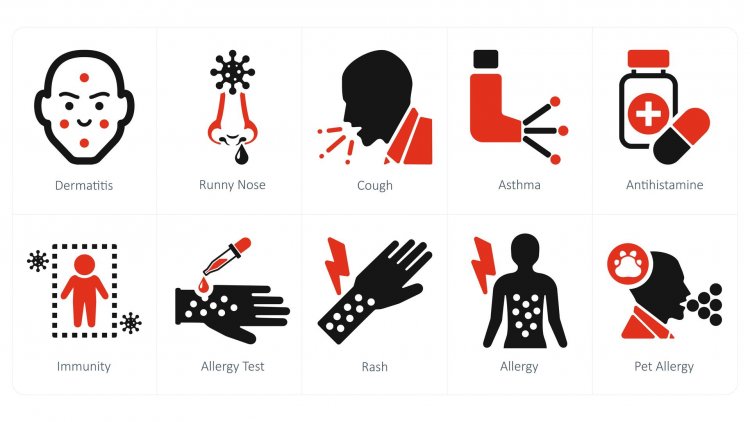Allergy Alchemy: Mastering the Art of Navigating Modern Treatments
In today’s world, where environmental changes and lifestyle adjustments are a constant, allergies have become a prominent health concern for many. From sneezing fits to severe anaphylactic reactions, allergies can range from minor irritations to life-threatening emergencies. As our understanding of allergies evolves, so too does the arsenal of treatments available. Navigating this intricate world of allergy treatments requires a deep dive into both conventional and alternative approaches. Let’s explore the dynamic realm of allergy management and discover how to tailor treatments to individual needs.


Conventional Allergy Treatments: A Multi-Faceted Approach
Antihistamines: The Frontline Defenders
Antihistamines are among the most commonly used medications for allergy relief. They work by blocking histamine, a chemical that the body releases during an allergic reaction. By interfering with this process, antihistamines can alleviate symptoms such as sneezing, itching, and runny nose.
Types of Antihistamines:
- First-Generation Antihistamines: These include older medications like diphenhydramine (Benadryl). While effective, they are known for causing drowsiness, which can limit their daytime use.
- Second-Generation Antihistamines: Newer options such as loratadine (Claritin) and cetirizine (Zyrtec) offer similar benefits with fewer sedative effects, making them more suitable for daily use.
Decongestants: Clearing the Pathways
Decongestants work by shrinking swollen nasal tissues and blood vessels, providing relief from nasal congestion. They are often used in conjunction with antihistamines to tackle multiple symptoms.
Popular Decongestants Include:
- Pseudoephedrine: Found in medications like Sudafed, this decongestant is effective but requires careful use due to potential side effects like increased blood pressure.
- Phenylephrine: Available in both prescription and over-the-counter forms, it is less effective than pseudoephedrine but may be preferred in certain cases.
Nasal Corticosteroids: Targeted Relief
Nasal corticosteroids, such as fluticasone (Flonase) and budesonide (Rhinocort), offer targeted relief by reducing inflammation in the nasal passages. They are especially beneficial for individuals with chronic nasal congestion and allergic rhinitis.
Benefits of Nasal Corticosteroids:
- Long-Term Management: Effective for long-term control of allergy symptoms.
- Minimal Systemic Effects: When used correctly, these medications have fewer systemic side effects compared to oral corticosteroids.
Allergy Shots: A Long-Term Solution
Allergy immunotherapy, commonly known as allergy shots, is a long-term treatment aimed at reducing sensitivity to allergens. This method involves administering gradually increasing doses of allergens to desensitize the immune system.
How Allergy Shots Work:
- Initial Phase: Frequent injections over a few months to build up tolerance.
- Maintenance Phase: Less frequent injections to sustain the desensitization effects.
Advantages of Allergy Shots:
- Potential Cure: For some individuals, allergy shots can offer lasting relief even after treatment ends.
- Reduced Medication Dependence: Successful immunotherapy may lead to a decrease in the need for allergy medications.
Considerations:
- Commitment: Allergy shots require a significant time investment and regular visits to an allergist.
- Side Effects: Some individuals may experience localized reactions or, rarely, systemic allergic reactions.

Emerging Therapies and Alternative Approaches
As science advances, new treatments are emerging to offer more personalized and effective solutions for allergy management.
Sublingual Immunotherapy (SLIT): A New Frontier
Sublingual immunotherapy involves placing allergen extracts under the tongue, where they are absorbed into the bloodstream. This method offers an alternative to allergy shots and can be administered at home.
Benefits of SLIT:
- Convenience: Can be taken daily without the need for regular doctor visits.
- Safety: Generally well-tolerated with fewer systemic side effects compared to injections.
Current SLIT Options:
- Allergy Tablets: Available for certain allergens, such as grass pollen and ragweed.
- Allergy Drops: Customized formulations that may be prescribed by an allergist.
Biologics: Targeted Treatments for Severe Allergies
Biologic drugs represent a cutting-edge approach for managing severe allergic conditions, including asthma and chronic rhinosinusitis with nasal polyps.
Examples of Biologics:
- Omalizumab (Xolair): Targets IgE antibodies involved in allergic reactions, used for severe asthma and chronic urticaria.
- Dupilumab (Dupixent): Affects inflammatory pathways, providing relief for conditions like asthma and atopic dermatitis.
Pros and Cons:
- Pros: High efficacy in reducing severe allergic symptoms and inflammation.
- Cons: High cost and potential for side effects, requiring careful consideration and monitoring.
Lifestyle Adjustments and Complementary Therapies
Managing allergies isn’t solely about medication; lifestyle adjustments and complementary therapies can play a crucial role in improving quality of life.
Environmental Controls: Reducing Allergen Exposure
Reducing exposure to allergens is a foundational strategy in allergy management. Simple changes in daily habits can make a significant difference.
Strategies Include:
- Keeping Windows Closed: Reduces the amount of pollen entering the home.
- Regular Cleaning: Frequent dusting and vacuuming with HEPA filters can minimize indoor allergens like dust mites and pet dander.
- Air Purifiers: Using air purifiers with HEPA filters can help remove airborne allergens.
Complementary Therapies: Exploring Additional Options
In addition to conventional treatments, some individuals find relief through complementary therapies, though these should be discussed with a healthcare provider.
Common Complementary Approaches:
- Acupuncture: Some studies suggest that acupuncture may help alleviate certain allergic symptoms.
- Herbal Remedies: Herbs like butterbur and stinging nettle have shown potential in reducing allergy symptoms, though more research is needed.
Personalizing Allergy Management: A Customized Approach
Navigating allergy treatments requires a personalized approach that takes into account individual symptoms, triggers, and responses to various therapies. Working closely with an allergist or healthcare provider is crucial in developing a tailored management plan that integrates both conventional and alternative methods.
Key Steps in Personalizing Treatment:
- Accurate Diagnosis: Proper testing to identify specific allergens and sensitivities.
- Treatment Options: Evaluating the effectiveness of different treatments based on individual response and lifestyle.
- Ongoing Management: Regular follow-ups to adjust treatments and address any emerging concerns.
Overall Conclusive Paragraph:
Navigating the complex world of allergy treatments involves a multifaceted approach that combines conventional therapies with emerging innovations and lifestyle adjustments. By understanding the various options available—from antihistamines and decongestants to cutting-edge biologics and personalized immunotherapy—individuals can find effective strategies for managing their allergies. The journey towards optimal allergy management is not one-size-fits-all but requires careful consideration of personal needs, preferences, and medical advice. As new treatments and research continue to evolve, staying informed and proactive in one's approach to allergy care will pave the way for better health and quality of life.
Disclaimer: The information provided in this article is for educational purposes only and should not be considered medical advice. If you have any health concerns or are experiencing symptoms, it is important to consult with a healthcare professional, such as a doctor or clinic, for proper diagnosis and treatment. Always seek the advice of your doctor or other qualified health provider with any questions you may have regarding a medical condition. Do not disregard professional medical advice or delay in seeking it because of something you have read in this article.
What's Your Reaction?





















